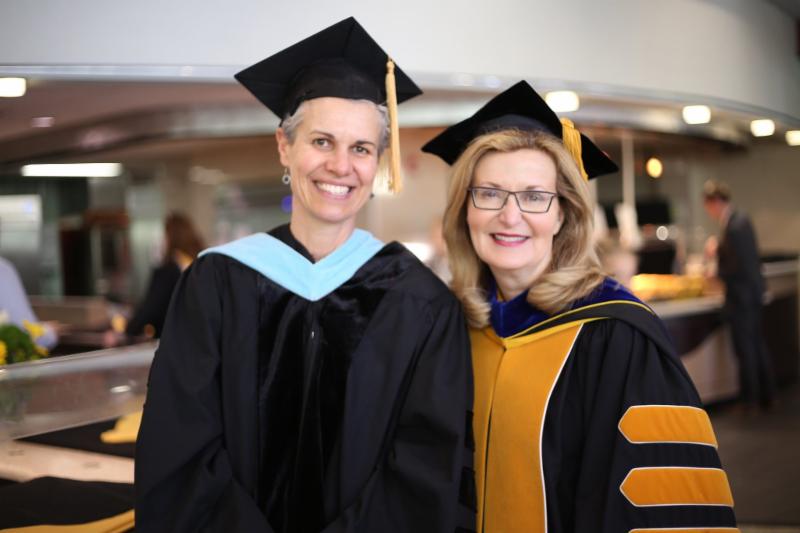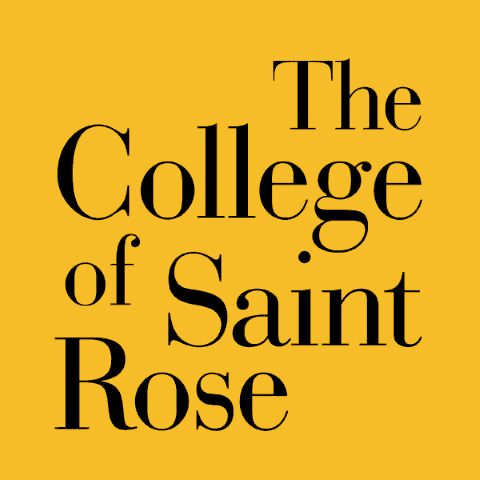
Professor Drey Martone with Saint Rose President Carolyn J. Stefanco after the 2019 commencement ceremony.
Last spring, Saint Rose graduate student Drey Martone spent six weeks student teaching full time at the Albany School of Humanities. Her supervisor, Associate Professor of Special Education Susan DeLuke, made regular observations.
The progression was pretty typical:
“The first lesson she saw did not go great. I’d just met the students,” recalls Martone, of an ELA unit in a resource classroom. “The second time, I got a little better, and I did even better the third time. The fourth lesson was out of the ballpark. You could tell students were really digging into the content.”
Not typical was that Martone came to the elementary school with a doctorate in education and more than 20 years of teaching under her belt, along with an extensive vitae of fieldwork, published papers, and conference presentations.
She is a Saint Rose associate professor of teacher education. She did her student teaching as she earned her Saint Rose Advanced Certificate in Special Education, grades 1 to 6. And in spite of her extensive background, Martone was comfortable putting herself in the shoes of a beginning teacher – and seeing DeLuke and other colleagues as mentors.
“I wasn’t nervous because I believe in self-reflection,” she said soon after collecting her diploma alongside her own students. “Reflection is key. Even in the classes I teach at Saint Rose, I’ll sometimes think ‘I didn’t do enough to pull that student in. What can I do differently?’”
Although perhaps playing the role of both professor and graduate student is unique, for Martone, teaching and learning simultaneously is a way of life.
The 10-year faculty member has always added layers to her understanding of how to reach students, who she believes are often blamed for not learning. To that end, Martone takes classes, works in local schools, participates in online learning communities, and attends conferences.
She pursued the Saint Rose advanced certificate – while teaching her full course load and balancing other academic responsibilities – to better grasp how to support elementary school students with diagnosed and undiagnosed challenges.
“I enjoy teaching, and I enjoy research very much,” she explained. “But my goal is to get my Saint Rose students and myself as close as possible to where the actual learning happens. I want to infuse my teaching with what I learn from elementary students.”
Career switch
Born in New York City, she graduated from Amherst College and then launched a management consulting career at Deloitte Consulting. But motivated by a longstanding interest in education, she left to teach at a parochial elementary school in Harlem.
Martone loved the work. But she quickly saw that a good number of students were not engaged. The classroom was rife with behavior issues. She changed her approach, ditching textbooks for an interactive study of the A Train, the famous subway line that follows Manhattan from tip to top.
Working in groups students examined communities along the route. They learned math by calculating distances and studied ethnic groups by collecting restaurant menus. The class took field trips and ultimately created an A Train brochure.
“I was amazed at the difference. The students could see everything they did applied,” Martone recalled. “By changing my teaching style, I changed them as learners.”
Martone later earned her master’s degree at Fordham and her doctorate at the University of Massachusetts at Amherst. Then and now, she sees lesson plans wherever she goes.
Unfortunately, Martone says the emphasis on inventive hands-on projects like the A Train brochure has diminished in favor of scripted lessons. While putting together elaborate units is time-consuming, she is convinced students come out on top when the learning is relevant and the disciplines combined.
Martone is concerned, too, about how best to teach science, technology, engineering, and math., as well as how to follow a curriculum without being held captive to it.
“Teachers have a lot of pressure from the top down. Some are told ‘You have to be on page 121 by this date,’” she explained. “But I say to my Saint Rose students, ‘Don’t let them take the teacher out of teaching. You are the conduit through which this comes, and you have to make it meaningful.’”
She continues developing her own practice through collaborations at Pine Hills Elementary School as well as the Albany School of Humanities. And she devoted a sabbatical to examining how districts across the state teach STEM.
To earn the Saint Rose advanced certificate, she took five classes over two years, studying with DeLuke and Associate Professor Dana Abbott.
Martone gained respect for her colleagues and appreciated the quality of education Saint Rose offers. She now introduces the special education strategies she learned to her own Saint Rose students.
“I told people in my classes that I’ve gone back to school,” she said. “Sometimes, when they moaned about a project I’d say, ‘Oh no, I’ve done this work, and you can, too.”’
Martone recently took an online course about teaching mathematics. She is setting up fieldwork partnerships for the fall. A member of the College’s Professional Development Committee, she enjoys seeing how her peers develop their skills. And, she’s considering her next certificate.
“I’m thinking of taking teaching English as a second language,” she said. “But not tomorrow.”



Comments posted on this site are held in moderation until approved by a site administrator. Vulgar, profane, obscene, offensive terms or personal attacks will not be tolerated.